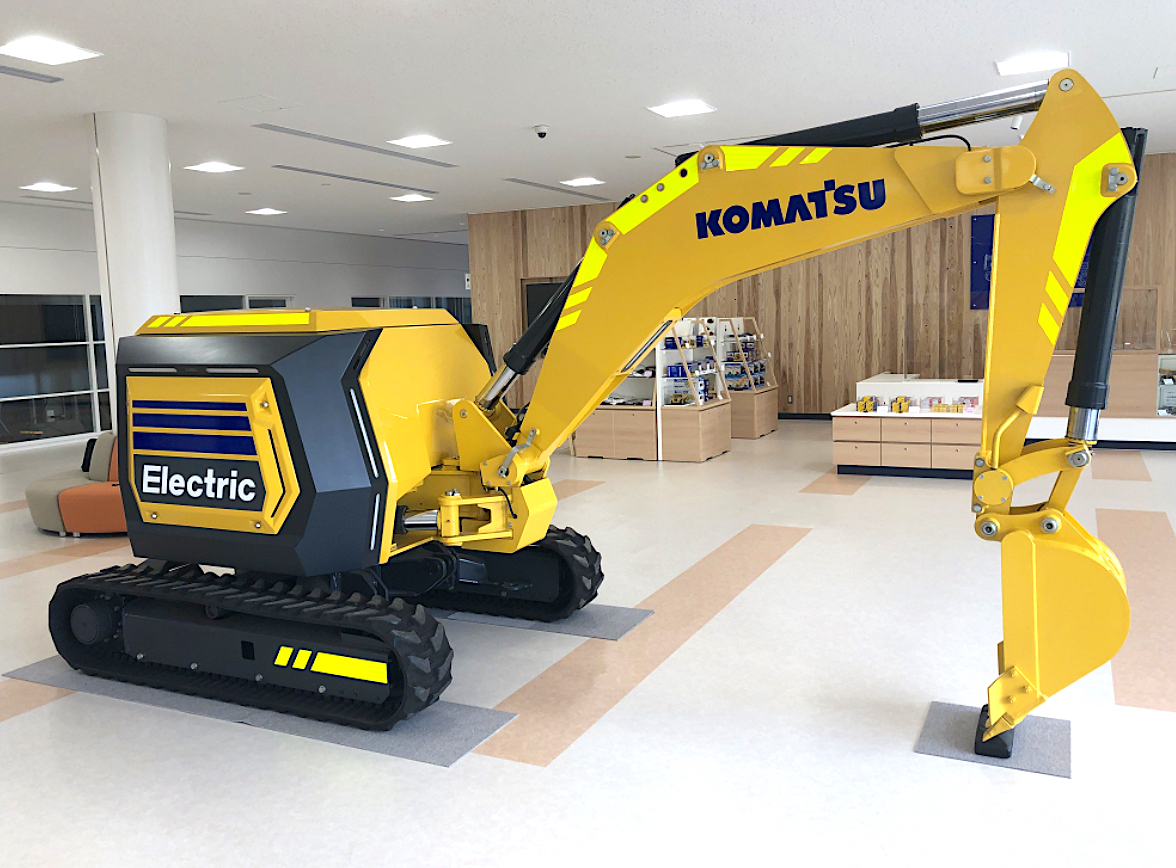Top Features of the remote control excavator That Can Enhance Your Project
Wiki Article
Discover the Importance of Excavator in Modern Building Projects
Excavators are necessary tools in modern building and construction projects. Their convenience permits them to execute a wide variety of jobs, from excavating and grading to demolition and site preparation. Advanced attributes, such as hydraulic attachments and general practitioners, boost their abilities and effectiveness on task websites. As the market advances, the relevance of excavators grows much more. Recognizing their duty can disclose understandings right into the future of building and construction methods. What exists ahead for these makers?The Flexibility of Excavators in Different Projects
Excavators are frequently associated with large-scale construction jobs, their flexibility permits them to be used in a vast array of applications, from property landscaping to utility maintenance. In metropolitan settings, excavators can navigate tight areas to dig foundations for homes or set up water drainage systems. Their capacity to carry out fragile tasks makes them optimal for landscaping jobs, where they can dig deep into for fish ponds or plant trees. On top of that, excavators play an essential function in utility maintenance, effectively digging trenches for pipes or cords without interrupting surrounding areas. In agricultural applications, they aid in land clearing up and dirt prep work. In addition, their versatility enables them to be geared up with various attachments, enhancing their capability throughout various tasks. This diverse nature of excavators not only enhances various building processes but also shows their integral duty in modern framework growth and upkeep.Key Attributes and Types of Excavators
The discussion on vital functions and kinds of excavators highlights the necessary attributes that make these makers indispensable in construction. Numerous excavator kinds, each developed for specific jobs, show their flexibility and efficiency throughout different applications. rc excavator. Recognizing these features and classifications is vital for enhancing their use in modern-day construction tasksExcavator Types Review
Excavators play a critical role in contemporary building, supplying flexibility and performance across different tasks. These heavy machinery devices been available in several kinds, each tailored for particular applications. The most common types consist of crawler excavators, recognized for their security on unequal surface, and rolled excavators, which give greater flexibility on smooth surface areas. Tiny excavators are preferred for small projects and limited spaces, while long-reach excavators are developed for deep digging. Furthermore, there are specific excavators, such as hydraulic excavators, which enhance power and precision. Each kind includes special abilities, making them necessary for jobs varying from digging and grading to demolition and material handling. Understanding these variants allows construction specialists to select the right excavator for their job needs.Trick Includes Explained
Recognizing the key functions of excavators enhances their reliable application in building and construction tasks. Excavators are identified by their powerful hydraulic systems, which give the needed force for excavating, training, and relocating materials. Their verbalized arms permit a broad variety of activity, helping with exact procedures in constrained areas. Furthermore, the variety of accessories, such as containers, grapples, and augers, increases their convenience to fulfill various project needs. The dimension and weight of excavators additionally add to their security and ability to move on different surfaces. Advancements in modern technology have led to the combination of GPS and automation, boosting accuracy and performance in excavation jobs. These features collectively place excavators as indispensable devices in modern-day construction.Applications in Building
Transforming building websites, excavators play a pivotal function across various applications, varying from residential structure tasks to large-scale framework advancements. These flexible makers are equipped for tasks such as excavating foundations, trenching for utilities, and site grading. Different kinds of excavators, consisting of crawler, wheeled, and mini excavators, provide particular advantages customized to the project demands. Spider excavators master harsh surfaces, while rolled excavators supply wheelchair on smooth surfaces. Mini excavators are perfect for constrained rooms, making them preferred in city setups. The efficiency and power of excavators considerably quicken building processes, making certain timely job conclusion. Their versatility further boosts their significance, permitting construction groups to tackle a varied array of challenges effectively.Enhancing Performance and Performance on Task Sites
Making the most of effectiveness and productivity on task sites is a vital goal in modern-day building. Excavators play a pivotal role in accomplishing this goal by enhancing different tasks. Their capacity to carry out multiple features-- such as training, grading, and digging-- minimizes the requirement for extra equipment, therefore saving time and resources.Moreover, excavators boost workflow by permitting faster completion of tasks. With advanced attributes like hydraulic attachments and general practitioners modern technology, they can implement exact operations that minimize mistakes and rework. This precision not only boosts the top quality of job but additionally optimizes material usage, adding to set you back savings.The convenience of excavators allows them to adjust view publisher site to different website conditions, guaranteeing that tasks progress smoothly no matter difficulties. By incorporating excavators into building procedures, groups can greatly improve their total efficiency, resulting in timely job conclusion and raised profitability.Security Advantages of Utilizing Excavators
Excavators considerably improve security on building and construction websites with improved operator presence and lowered hand-operated labor dangers. By providing operators with a clear view of their surroundings, excavators help to stop mishaps and injuries. Additionally, the equipment reduces the requirement for employees to engage in hazardous manual jobs, even more advertising a much safer work environment.Improved Operator Visibility
Construction sites can be disorderly and filled up with possible threats, improved driver presence plays a crucial duty in guaranteeing safety when using excavators. Modern excavators are designed with big, unhampered windows and strategically placed mirrors, enabling operators to preserve a clear sight of their environments (rc excavator). This enhanced exposure is crucial for finding pedestrians, various other equipment, and various challenges, significantly lowering the danger of crashes. In addition, lots of excavators incorporate sophisticated technology, such as video cameras and sensors, to provide operators with additional viewpoints, even more boosting awareness. The capacity to see more clearly not just help in reliable operation however likewise promotes a much safer workplace, making it less complicated for drivers to browse complex building and construction websites without endangering safety and security criteriaLowered Guidebook Labor Dangers
When hand-operated labor is decreased via the use of excavators, many security benefits arise, noticeably boosting the wellness of building employees. Excavators lessen the physical strain connected with heavy lifting and repetitive jobs, efficiently decreasing the threat of musculoskeletal injuries. By automating procedures such as excavating, grading, and relocating materials, they permit employees to keep a much safer distance from potential risks. Furthermore, excavators are equipped with advanced safety functions, such as rollover protection systems and enhanced operator functional designs, which even more secure workers on website. The result is a substantial reduction in workplace accidents and injuries, causing enhanced performance and morale amongst construction teams. Ultimately, the adoption of excavators adds to a more secure and extra reliable building and construction setting.Excavators in Earthmoving and Website Prep Work
In contemporary building, a significant part of earthmoving and website preparation jobs counts on the efficiency and convenience of excavators. These equipments browse around these guys are designed to take care of various dirt types and terrain, making them important for rating, digging, and trenching activities. Their hydraulic arms can be geared up with different accessories, such as containers and augers, permitting drivers to customize their strategy based upon details job requirements.Excavators stand out at relocating large quantities of planet quickly and efficiently, which speeds up the total construction timeline. They can browse limited rooms and testing sites where typical devices might struggle, improving productivity. Furthermore, the precision of excavators warranties that site prep work follows stringent requirements, decreasing the danger of mistakes that could lead to pricey rework.The Duty of Excavators in Demolition Tasks
Excavators play a crucial function in demolition jobs, as they have the power and agility needed to dismantle frameworks effectively. Furnished with numerous add-ons such as hydraulic breakers, shears, and grapples, these equipments can adjust to various demolition requirements, whether for little buildings or big industrial websites. Their adaptability enables operators to take on complicated tasks while preserving security and precision.In enhancement to their demolition capacities, excavators assist in particles removal, guaranteeing that work sites stay risk-free and organized. By breaking down structures right into manageable items, they permit streamlined cleaning and recycling of materials, aligning with modern-day sustainability efforts.Moreover, excavators can access tight spaces and navigate irregular terrain, making them important in urban demolition tasks. In general, their durable design and multifunctionality make excavators a crucial possession in the demolition phase of construction, contributing substantially to task timelines and effectiveness.

Future Trends in Excavator Technology and Usage
As the building and construction market progresses, improvements in excavator technology are positioned to transform their use and performance markedly. One considerable fad is the integration of automation and expert system, allowing excavators to run with very little human intervention. This shift will certainly enhance accuracy in jobs such as grading and trenching, lowering human mistake and boosting productivity.Additionally, the surge of hybrid and electrical excavators is forming a much more sustainable building and construction environment, decreasing carbon discharges and gas expenses. Boosted telematics systems are likewise emerging, making it possible for real-time monitoring of device performance and maintenance requirements, which can bring about better functional efficiency and longer devices lifespan.Moreover, developments in attachment innovation are expanding the convenience of excavators, allowing them to carry out a more comprehensive series of tasks. The combination of these trends demonstrates a future where excavators are smarter, greener, and extra versatile, inevitably reshaping construction job characteristics.
Often Asked Questions
Exactly How Do Excavators Compare to Other Building And Construction Machinery?
Excavators, characterized by their convenience and power, succeed in excavating and earthmoving contrasted to various other machinery. Their capacity to carry out numerous jobs, consisting of training and demolition, makes them get redirected here essential in building and construction projects, boosting total effectiveness.
What Is the Ordinary Life Expectancy of an Excavator?
The typical life expectancy of an excavator typically ranges from 7,000 to 10,000 operating hours, relying on maintenance, usage problems, and design. Proper care can extend this lifespan, guaranteeing peak performance throughout its operational years.Exactly How Are Excavators Maintained for Ideal Performance?
Excavators require normal upkeep for peak efficiency, consisting of regular examinations, liquid checks, filter substitutes, and prompt repairs. Carrying out a preventive maintenance routine aids prolong their lifespan and assurances efficient procedure in different construction atmospheres.What Are the Expenses Related To Renting Out vs. Getting an Excavator?
The expenses related to renting versus getting an excavator vary considerably. Leasing offers lower upfront expenditures but can gather gradually, while purchasing requires a significant initial financial investment, yet supplies long-lasting savings and asset ownership advantages.What Training Is Needed to Operate an Excavator?
Operating an excavator requires specialized training, usually consisting of security procedures, machine operation techniques, and environmental recognition. Qualification programs commonly mandate practical experience, making it possible for drivers to manage numerous jobs successfully while ensuring compliance with industry guidelines. The most common types consist of crawler excavators, recognized for their stability on uneven terrain, and rolled excavators, which provide better wheelchair on paved surfaces. Small excavators are preferred for small-scale projects and tight spaces, while long-reach excavators are created for deep digging. Furthermore, there are customized excavators, such as hydraulic excavators, which enhance power and precision. Various types of excavators, consisting of spider, wheeled, and mini excavators, provide certain benefits customized to the task requirements. Spider excavators succeed in rough surfaces, while rolled excavators provide movement on paved surface areas.Report this wiki page